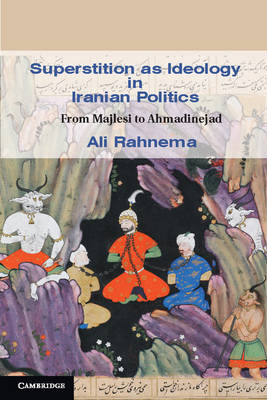
Superstition as Ideology in Iranian Politics
Cambridge University Press (Verlag)
978-0-521-18221-8 (ISBN)
A superstitious reading of the world based on religion may be harmless at a private level, yet employed as a political tool it can have more sinister implications. As this fascinating book by Ali Rahnema, a distinguished Iranian intellectual, relates, superstition and mystical beliefs have endured and influenced ideology and political strategy in Iran from the founding of the Safavid dynasty in the sixteenth century to the present day. As Rahnema demonstrates through a close reading of the Persian sources and with examples from contemporary Iranian politics, it is this supposed connectedness to the hidden world that has allowed leaders such as Muhammad Reza Shah Pahlavi and Mahmud Ahmadinejad to present themselves and their entourage as representatives of the divine, and their rivals as the embodiment of evil.
Ali Rahnema is Professor of Economics and Director of the Master of Arts program in Middle East and Islamic Studies at The American University of Paris. His many publications include An Islamic Utopian: A Political Biography of Ali Shariati (1998, 2000), Pioneers of Islamic Revival (1994, 2006), Islamic Economic Systems (with Farhad Nomani, 1994) and The Secular Miracle: Religion, Politics, and Economic Policy in Iran (with Farhad Nomani, 1990).
Introduction; Part I. Politicizing Occult Islam: 1. Ahmadinejad: a touch of light; 2. Mohammad Reza Shah Pahlavi's supernatural Shi'ism; 3. Shah Esma'il Safavi: the quintessentially occult Shi'i king; Part II. Popular Shi'ism: Majlesism: 4. Milieu, childhood, sanctity and fame; 5. From conceptualization to officialization of a religio-political ideology; 6. Deficiency and defectiveness of the human mind; 7. Society needs the leadership of jurists and/or kings; 8. Superstitious education: fogging minds, fostering resignation; 9. Reconfigurating the necessities of belief: articulating a state religion; 10. Majlesism as an ideology; Conclusion.
| Erscheint lt. Verlag | 13.6.2011 |
|---|---|
| Reihe/Serie | Cambridge Middle East Studies |
| Zusatzinfo | Worked examples or Exercises |
| Verlagsort | Cambridge |
| Sprache | englisch |
| Maße | 154 x 230 mm |
| Gewicht | 450 g |
| Themenwelt | Geisteswissenschaften ► Geschichte ► Regional- / Ländergeschichte |
| Geisteswissenschaften ► Philosophie ► Östliche Philosophie | |
| Sozialwissenschaften ► Politik / Verwaltung ► Staat / Verwaltung | |
| Sozialwissenschaften ► Soziologie | |
| Schlagworte | Iran; Politik/Zeitgesch. |
| ISBN-10 | 0-521-18221-2 / 0521182212 |
| ISBN-13 | 978-0-521-18221-8 / 9780521182218 |
| Zustand | Neuware |
| Haben Sie eine Frage zum Produkt? |
aus dem Bereich


